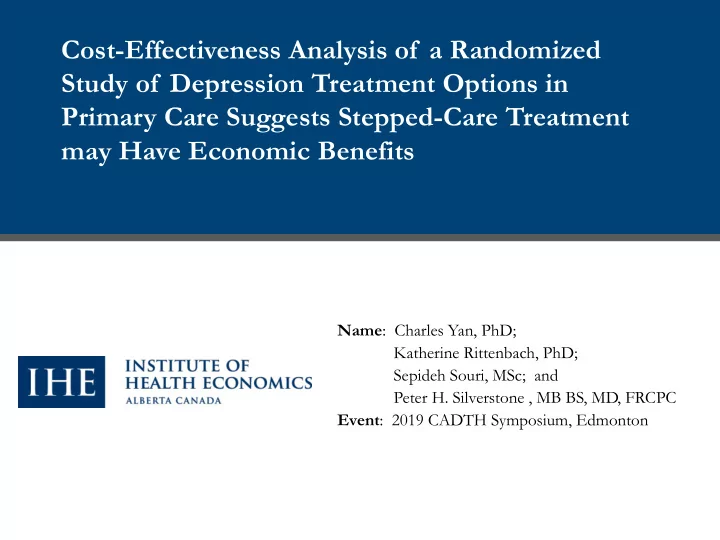

Cost-Effectiveness Analysis of a Randomized Study of Depression Treatment Options in Primary Care Suggests Stepped-Care Treatment may Have Economic Benefits Name : Charles Yan, PhD; Katherine Rittenbach, PhD; Sepideh Souri, MSc; and Peter H. Silverstone , MB BS, MD, FRCPC Event : 2019 CADTH Symposium, Edmonton
Disclosure and Acknowledgements • Financial support for this study was provided entirely by a financial contribution from Alberta Health Services (AHS). • This study was supported by the Addiction & Mental Health Strategic Clinical Network (A&MH SCN), AHS. • We would like to thank – the Primary Care Networks (PCN) for participating in the clinical trial. – Christopher McCabe for comments on previous draft; and – Deena Hamza, Stefanie Kletke and Tennile Tavares for research assistance.
Presentation Outline • Background • Objectives • Analytic model • Results • Lessons/conclusions: – While more work is required to identify the most clinically effective versions of a stepped- care pathway (SCP), our findings suggest that the SCP for depression may have substantial potential to improve healthcare system value.
Background • Some studies suggested that a stepped-care pathway (SCP) is an effective approach to depression management in primary care. – The SCP model starts from self-identification of depression risk and severity. – Treatment guidelines are then given based on the screening results • both antidepressant medication and psychosocial interventions • However, there is little information regarding the cost-effectiveness of a specific SCP.
Background (Cont’d) • a RCT conducted in Alberta to assess the impact of a SCP, compared to other treatment options – 1,400 patients – 12-week follow-up – 4 treatment arms: 1. a standard care (SC); 2. a treatment-as-usual (TAU); 3. an online cognitive behavioural therapy (CBT); 4. a stepped-care pathway (SCP). – Outcomes: PHQ-9, EQ-5D – The SCP was developed in Calgary • Trial registration: This trial was registered with Clinical Trials database. – Identifier: NCT01975207
Objective • We conducted an economic analysis to: – To estimate medical costs of depression, and – To determine whether the SCP was cost-effective • Study population: – The adults who visited their primary care physicians and were screened for depression; – Subgroup: screened positive for depression symptoms (PHQ-9 score over 10 at baseline) • Interventions: – The analysis compared SCP with other 3 treatments
Methods: data collection • EQ-5D – Baseline, and – 12 weeks post-randomization • Costs of physician, outpatient, and inpatient services: – 12 weeks pre-randomization, – 12 weeks post-randomization, and – from 12 weeks to 1-year post-randomization. – Data sources: • provincial healthcare administrative databases
Methods: statistical analysis • Intention-to-treat (ITT) approach was used – helps avoid bias • multiple imputation: – Handle Missing data; • OLS regression and generalized linear model (GLM): – Adjust for imbalances in baseline characteristics • one-way ANOVA test: – Test the difference between intervention arms • pairwise comparison of mean: – Test the difference between each pair of intervention arms • mean-comparison t-test : – Test the difference between baseline and 12-week post randomisation for each intervention arm
Results: effectiveness • Significant improvement in PHQ-9 and EQ-5D from baseline to 12-week post randomisation in all arms – In all participants, the mean change • 0.72 (95% CI 0.61 – 0.82) in PHQ-9 and • 0.024 (95% CI 0.021 – 0.027) in EQ-5D – In depressed participants (PHQ-9 > 10 at baseline), the mean change • 4.8 (95% CI 4.58 – 5.02) in PHQ-9 and • 0.103 (95% CI 0.092 – 0.115) in EQ-5D • However, there was no significant difference between groups.
CE Results: In all participants In all participants, SCP (Arm 4) had highest probability being cost- effective
CE Results: In depressed subgroup SCP (Arm4) had highest probability being cost-effective when WTP > $50,000; when WTP < $50,000, iCBT (Arm3) better.
Number of participants receiving physician, outpatient, and/or inpatient services Physician + Physician + Physician + Arm No services Physician only outpatient + Total outpatient inpatient inpatient All participants Arm 1 (SC) 4 (1.0%) 179 (43.4%) 176 (41.99%) 3 (0.73%) 53 (12.9%) 412 Arm 2 (TAU) 8 (2.0%) 160 (40.3%) 160 (39.80%) 2 (0.5%) 69 (17.4%) 397 Arm 3 (iCBT) 4 (1.0%) 188 (45.3%) 164 (37.83%) 7 (1.69%) 59 (14.2%) 415 Arm 4 (SCP) 3 (1.6%) 75 (41.0%) 88 (48.08%) na 17 (9.3%) 183 Depressed subgroup Arm 1 (SC) 0 (0%) 21 (37.5%) 28 (50%) na 7 (12.5%) 56 Arm 2 (TAU) 2 (3%) 21 31.8(%) 35 (53%) na 8 (12.1%) 66 Arm 3 (iCBT) 0 (0%) 22 (44%) 23 (46%) na 5 (10%) 50 Arm 4 (SCP) 0 (0%) 12 (35.3%) 18 (52.9%) na 4 (11.8%) 34
Discussion • Our study found no significant difference between SCP, SC , TAU and iCBT in terms of depression symptom reduction and EQ-5D improvement. • Interestingly, our CEA revealed SCP is more cost- effective than the other alternatives. • A relatively small portion of patients received hospital stays in SCP group. – Our finding may be driven by this, given that hospital costs are • 8 times outpatient costs and • 12 times physician costs • While more work is required to identify the most clinically effective versions of a SCP, our findings suggest – that the care pathway may have substantial potential to improve healthcar system value.
Limitations • The sample size was much smaller in the particular SCP group than the others. • The effectiveness data was derived from 12- week trial and then assumed the observed quality of life at 12-week would be maintained until one year. • The set-up costs SCP were not included in the economic analysis.
cyan@ihe.ca 1.780.448.4881 www.ihe.ca
Recommend
More recommend